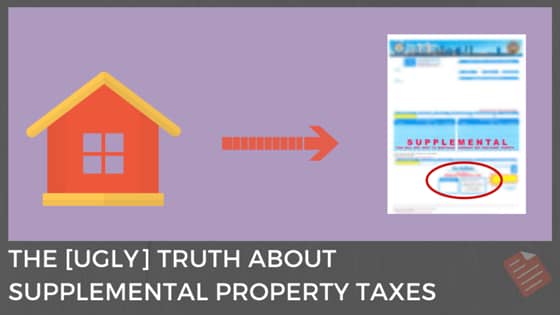Well, kind of ugly. I mean— when have you ever heard of “taxes” being referred to as beautiful? Exactly.
Anyway, it’s a good thing you’re here so you can learn the dirty FACTS about these…( err…uh)…”non-optional government donation fees”… that you’re probably not seeing explained very well elsewhere.
[SCROLL DOWN FOR VIDEO]
So pay attention: If you are buying a property in California (or bought) for MORE than it last sold for, chances are [very high] that you’ll be receiving a “Supplemental Tax Bill” or two in the mail in the months following the transaction.
Let’s talk about this super fun and exciting stuff!
Firstly, in order to understand California Supplemental Property Taxes, you’ll first need to have a basic understanding of the California property tax system as well as Proposition 13.
In sunny California, the way the property tax system is set up, is that when a property is SOLD, its assessed value for property taxation purposes is re-adjusted to the sales price of the property. Now since the passing of Prop 13, from the date of the sale forward, the MAXIMUM annual increase in the assessed value is limited to 2% per year.
For example, if a property sold in January of 2020 for $500K, then the maximum allowable assessed value in the year 2021 would be $510K, and so on. So if the housing appreciation rate is 5% annually for the next five years, the assessed value is still limited to only increasing 2% per year.
So far, so good?
So when you buy a property, part of the closing costs are pro-rated property taxes based on the OLD assessed value of the property (prior to the sale), so the pro-rated taxes were paid based on a value lower than the newly assessed value (the sales price). Now, the county tax assessor realizes that of course and wants to make sure you don’t get any breaks, so they send out a “supplemental property tax” bill based on that difference.
For example, let’s say you buy a property for $500K, and the assessed value at the time of the sale was $400K. Once you close escrow, the property will be re-assessed at the sales price of $500K.
Stick with me…
Now to determine the Supplemental Assessment Value (that is, the value difference on which your supplemental taxes will be based), The county assessor will subtract the property’s prior assessed value from its newly assessed value, and the difference between the two is the NET SUPPLEMENTAL Value that will be assessed and applied as a supplemental assessment.
Understand this: the supplemental assessment could be either a positive amount, or—let’s say in the case of a reassessment that results in a value that is less than the prior assessed value— a negative amount— which would result in a supplemental REFUND check, rather than a bill!
Now the fiscal year runs from July 1st through June 30th and the supplemental tax (or refund if the new value is less than the old one) becomes effective the first day of the month following the sale, and the amount is pro-rated based on the number of months remaining in the fiscal year.
Here’s a table showing the factor to multiply the supplemental taxes by.

For example, if you purchased the property mentioned above in September for $500K and the previously assessed value was $400K, then the supplemental assessment value would be $100K (the increase in value). You would then take this amount and multiply it by the tax rate for your area.
The average tax rate in much of San Diego is approximately 1.25%, so in this case, that would be $1,250. You then take that amount and multiply it by the corresponding factor in the above table for the number of months remaining. Since the supplemental tax goes into effect in October (because the sale closed in September), we would multiply that by .75, giving us a supplemental tax bill of $930.
Now if you close between January 1st and May 31st, then you will receive TWO supplemental tax bills. Since the new Fiscal year begins in July, the second supplemental bill accounts for the property’s change in value for the 12 months of the coming fiscal year.
Keep in mind that these one-time supplemental property taxes will not be paid out of your impound account with your lender, so you will want to be sure to take care of these yourself.
Whew! Finally done with that…
Is your head spinning yet? This can be a confusing topic, so I hope this cleared it up for you. If you’re still confused, give us a call and we’ll be happy to explain! (619) 537-6016
You also won’t want to miss our tons of other home buyer resources!
Or— if you’re just curious about buying a home— then come and check out some awesome properties in San Diego.




